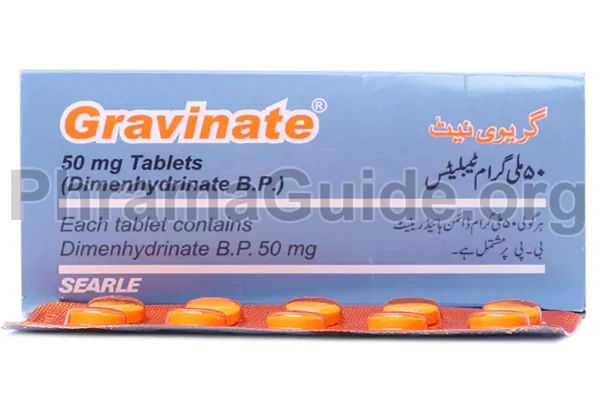Gravinate is an antihistamine medication commonly used to relieve symptoms of motion sickness, nausea, and vomiting. Like all medications, Gravinate can have both common and less common side effects. It’s essential to use this medication under the guidance of a healthcare professional and follow the prescribed dosage. Here are some common and less common side effects of Gravinate.
Common Side Effects:
- Drowsiness: Drowsiness is one of the most common side effects of Gravinate. It can affect your ability to concentrate and operate heavy machinery, so it’s advised not to drive or engage in activities requiring full alertness until you know how the medication affects you.
- Dry Mouth: Gravinate can cause a dry mouth, which may lead to discomfort and increased thirst.
- Blurred Vision: Some people may experience blurred vision or difficulty focusing while taking Gravinate.
- Dizziness: Dizziness is a common side effect, particularly when you change positions quickly.
- Urinary Retention: Gravinate can cause difficulty in urination in some individuals.
- Constipation: Constipation is another potential side effect.
Less Common Side Effects:
- Nausea: Although Gravinate is used to treat nausea and vomiting, some people may experience mild nausea as a side effect.
- Headache: Headaches can occur in some individuals.
- Nervousness or Restlessness: Some people may experience feelings of nervousness or restlessness.
- Stomach Upset: Gravinate can cause stomach discomfort or upset in some cases.
- Allergic Reactions: While rare, allergic reactions can occur, leading to symptoms such as skin rash, itching, swelling, severe dizziness, or difficulty breathing.
- Heart Palpitations: Less commonly, some individuals may experience heart palpitations.
- Hallucinations or Confusion: In rare cases, Gravinate can lead to hallucinations or confusion, especially in older adults.

What is Gravinate?
Gravinate is one of the leading brands of Dimenhydrinate, manufactured and marketed by Searle Pharmaceuticals Pakistan.
Gravinate : Available Formulations and Strengths
Presently, Gravinate is available in Tablet, Injection, and Syrup Forms
Gravinate Tablet : 50mg Strength.
Gravinate Injection : 50mg Strength.
Gravinate Syrup : 12.5mg/4ml
What Are The Possible Drug Interactions of Gravinate?
- Alcohol: Combining alcohol with Gravinate can increase the risk of drowsiness, dizziness, and impaired coordination. It is advisable to avoid alcohol when taking this medication.
- Other Central Nervous System (CNS) Depressants: The simultaneous use of other CNS depressants, such as sedatives, tranquilizers, or other antihistamines, can intensify the sedative effects of Gravinate and increase the risk of drowsiness and impaired motor skills.
- Monoamine Oxidase Inhibitors (MAOIs): MAOIs, a class of antidepressant medications, can interact with Gravinate and lead to an increased risk of side effects, including confusion, agitation, high blood pressure, and hyperactivity.
- Anticholinergic Medications: Gravinate has anticholinergic properties, and combining it with other medications with similar properties can lead to enhanced anticholinergic effects. These may include dry mouth, constipation, urinary retention, and blurred vision.
- Medications Affecting Heart Rhythm: Some medications that affect heart rhythm (e.g., certain antiarrhythmics or QT-prolonging drugs) can interact with Gravinate, potentially increasing the risk of arrhythmias.
- Medications with CNS Effects: Medications that have central nervous system effects, such as opioids or certain psychiatric drugs, may interact with Gravinate, potentially leading to intensified sedative effects.
- Antihypertensive Medications: Gravinate may reduce the effectiveness of antihypertensive drugs (medications to lower blood pressure) when used together.

Leave A Comment